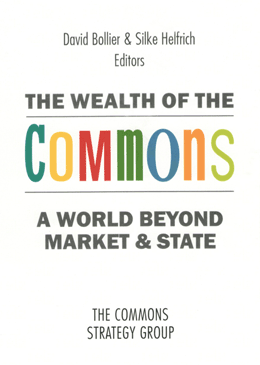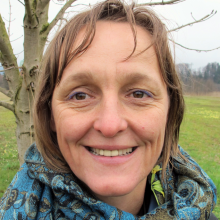Everything seems stuck in a quagmire, yet a new future is emerging.
BANGKOK, AUGUST 25, 2011. It’s hot and humid in the city. The air conditioner’s low buzz is the background noise for the academics and activists who have gathered for the “Re-Thinking Property” conference in the auditorium of Chulalongkorn University. The mostly Asian participants are inspired by the idea of analyzing property from the perspective of the commons, which then unexpectedly becomes a focus of the conference.
BERLIN, NOVEMBER 28, 2011. In Germany’s capital, some of the country’s most important climate researchers have convened even though the UN Climate Conference (COP 17) begins that very day in Durban, South Africa. At a press conference , they introduce the Mercator Research Institute on Global Commons and Climate Changeto the public (see pp. 392). When asked about the practicability of the commons approach, Ottmar Edenhofer, the institute’s director-designate, explains, “One cannot get concrete in a reasonable way if mistakes have already been made in the guiding concepts.” This is exactly what has happened over the course of the previous decades, Edenhofer believes, and for that reason the new institute seeks to assess the significance of the commons as a guiding concept in future climate research.
PORTO ALEGRE, JANUARY 24, 2012. Oppressive heat weighs heavily on the city’s downtown, whose streets are deserted; not a blade of grass is to be found. It is January, the summer break. About 100 people from various social movements and independent think tanks have been invited to the birthplace of the World Social Forum in southern Brazil to participate in a strategic dialogue as part of a Thematic Social Forum. They divide into 17 working groups to prepare for the Earth Summit in Rio de Janeiro – “Rio+20” – and to consider alternatives to both market-fundamentalist approaches and top-down “green economy” policies. One insight becomes clear – the guiding idea of more multilateral regulation for greater efficiencywill not solve persistent conflicts over how to use common resources. “Efficiency” simply cannot grapple with actual power relationships and legal structures, let alone overcome the market/state duopoly’s deep commitments to relentless growth. A new paradigm is needed, along with new forms of democracy and governance, most
Porto Alegre activists agreed after a week of dialogue.
PARIS, JANUARY 26, 2012. The city is about to be hit by a cold snap. In a surprising move, French politician Kader Arif resigns from his position as rapporteur of the European Parliament for the Anti-Counterfeiting Trade Agreement (ACTA) ahead of schedule. He explains: “I would like to harshly denounce the entire process that has led to the signing of this Agreement…. The European Parliament was denied the right to express its opinion and to put the citizens’ legitimate demands forward as arguments….” He adds, “I hereby warn the public about this unacceptable situation. I will not take part in this masquerade.” Negotiations leading up to the Agreement, which aims to control how people can create and share music, video and information on the Internet and other digital technologies, were carefully kept under wraps, deliberately excluding citizens from participating. The public outcry against ACTA is therefore less surprising than the blunt candor of Kader Arif’s words. Despite the bitter cold across Europe, there were numerous protests on the continent’s streets opposing ACTA and its secretive, corporate dominated policymaking process.
CAPE TOWN, JANUARY 27, 2012. People from many places around the Cape walk the four kilometers from Athlon Stadium to Rondebosch Commons together. They want to occupy this place to discuss problems they face every day: housing, land use, evictions, police brutality and increasing segregation. A commons does not exist, they say, if it exists in name only. For this reason, their three-day gathering on Rondebosch Commons focuses on how to reclaim control. Take back the commons is the name of the campaign. Its principles: “We are communities. We are all leaders. We include everyone. We are constructive. We must not only change the world, but ourselves. We demand our right to the Commons! We practice a culture of caring and sharing.” That vision seems to be too extreme. The police intervene with a massive show of force and arrest 42 people.
ROME, FEBRUARY 11, 2012. A blizzard has brought the Eternal City to a standstill. Covered with snow, it is as photogenic as ever. The audience is shivering at the Teatro Valle in its prime location between the Pantheon and the Piazza Navona. The theater staff has been occupying the Valle for eight months, seeking to reclaim their Valle as a bene comune (a commons), both in practical and institutional terms. Since its occupation, the Valle has not been a theater “where you simply go, buy a ticket and watch the show,” says theater technician and occupier Valerio. He points out: “The real show takes place before the show,” when people exchange ideas, work together, and take part in workshops and conversations that permeate the lives of those involved. Irene, a photographer at the Valle, explains: “It could be very important today that we learn to understand that everything is ours. Including the problems!”
On the theater’s stage this day, a gathering of international guests is considering an exciting question – how to systematically introduce principles of the commons in the European legal framework? Addressing this question are ACTA activists from Poland and Bulgaria, urban researchers from Spain, Italian professors of law, consultants to the European Commission, members of the German Pirate Party, and many others. They seek to initiate legislative proceedings at the European level, beginning in April 2012, to bring about a European Commons Charter. The Charter Campaign was started by, among others, scholars at the IUC (InternationalUniversityCollege), an institute of law at Turin University for graduate students from around the world. The IUC had already launched a 2011 water referendum in Italy in which an incredible 27 million people voted for “water as a commons,” defeating privatization proposals. The link between current political movements and the idea of the commons debate is not always this obvious. That is why a video featuring voices from the Teatro Valle is entitled Occupying the Commons, referring to both the traditional right of commoners to oppose enclosures and tear down fences, and to the Occupy Movement.
NEW YORK, FEBRUARY 16, 2012. More than 100 people assembled at the Ascension Church in Brooklyn for a three-day Occupy Wall Street Forum on the Commons. The event took place simultaneously online and offline, so that people in New York and everywhere else could participate at the same time. The Commons and Occupy movements share more than a basic commitment to understanding democracy itself as a commons; they both struggle to care for it and build it. Democracy ultimately only exists as a social practice, and must be constantly renewed. That was indeed the point of the New York forum as well as this book: we must actively coproduce the commons and find the ways to honor the principles of the commons. Developing appropriate governance systems that embody these principles will naturally advance the interests of the 99 percent.
AND ALL AROUND THE WORLD. In the months before this book went to press, there was a flurry of many other initiatives attempting to push the commons paradigm forward:
In Brussels, a Green Party foundation and two environmental think tanks, Oikos and Etopia, had to turn away people at the door for a major environmental conference on the commons.
In Geneva, the UN Institute for Training and Research (UNITAR) launched a four-module online course on the commons that attracted hundreds of participants from dozens of countries.
In San Francisco, Mayor Ed Wood formally launched The Sharing Economy Working Group to explore the economic and civic benefits of collaborative consumption and other forms of sharing.
In Naples, Italy, Mayor Luigi de Magistris convened municipal officials from throughout Italy to promote the protection of local commons. He also actively pushed an exploratory effort to win a Europe-wide vote for a European Directive on the Commons.
In London, The School of Commoning hosted a twelve-part seminar series, “The Emergence of the Commons-based Economy,” and in Barcelona and Buenos Aries, other commoners began plans to start their own commons educational projects.
And so it goes.
To us, the evidence seems clear: people everywhere have a strong desire to escape the helplessness that institutions impose on them, overcome the cynicism that blots out optimism, and transcend the stalemates that stifle practical action. Another world is possible beyond market and state. This book chronicles some new ways forward – and the beginnings of an international commons movement.
Silke Helfrich
David Bollier
May 1, 2012
 Buy at Levellers Press
Buy at Levellers Press 
